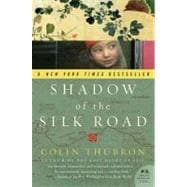
Shadow of the Silk Road
- ISBN13: 9780061231773
- ISBN10: 0061231770
- eBook ISBN(s): 9780061809620
- Additional ISBN(s): 9780061231728
- Edition: Reprint
- Format: Paperback
- Copyright: 2010-04-09
- Publisher: HarperCollins Publications
-
Your order must be $35 or more to qualify for free economy shipping. Bulk sales, PO's, Marketplace items, eBooks and apparel do not qualify for this offer.








